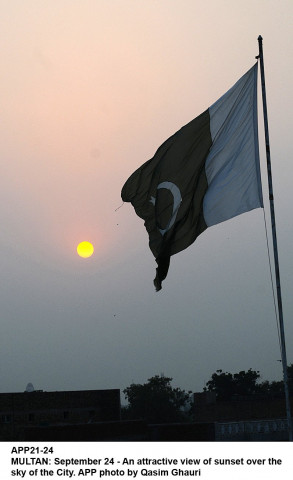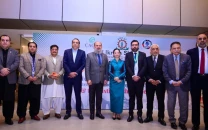Global Competitiveness Index: Pakistan improves, but remains among bottom 20 economies
World Economic Forum report compared 138 countries on which Pakistan stood at 122

On indicators like reliance on professional management, production process sophistication, willingness to delegate authority and university and industry collaboration in research and development, Pakistan also showed better progress this year. PHOTO: APP
The 2016-17 Global Competitiveness Report, which this time compared governance in 138 countries, ranked Pakistan 122nd - 16 from the bottom compared to 14th from the bottom last year. Last year, the WEF had conducted survey in 140 nations and Pakistan was placed at 126th.
Pakistan rated among top emerging economies
Although Pakistan improved its ranking by two notches, its score is still below the 2007 level, suggesting that the country has not sustained the competitiveness gains made during General retired Pervez Musharraf’s era.
This year, among 114 global competitiveness indicators, Pakistan showed improvements on 54 key indices, whereas on 50 indices the country lost its previous position. In 10 indices, the position remained the same as last year.
One of the positive aspects of the report for Pakistan is that public trust in politicians significantly increased and Pakistan was ranked at 85 this year - a leap of 14 points.
Pakistan has been making gradual progress, although still there is a lot of room to improve, said Dr Miftah Ismail, Board of Investment (BoI) chairman. His said the government was working towards the target of getting in the top 100 economies ranked by the WEF.
Pakistan’s flaws
The Global Competitiveness Report 2016-2017 also identified corruption as the most problematic factor for doing business in Pakistan - for the consecutive second year - followed by crime and theft, tax rates, access to finance and government instability.
Judicial independence was further compromised last year, which is constantly on the decline since the PML-N government has come into power, showed the findings of the report.
Pakistan lagging behind other South Asian states
Pakistan, at 122, ranks last amongst its South Asian neighbours, where India leads at 39th followed by Sri Lanka 71st, Bhutan 97th, Nepal 98th and Bangladesh at 106th, according to the report.
Since 2007, the gap between the best and worst performing economies in the South Asian region has increased in some of the drivers of competitiveness, mostly because of the deteriorating situation in Pakistan, noted the authors of the report. The quality of infrastructure has improved significantly in India, Bangladesh, and Sri Lanka, while it stalled in Nepal and deteriorated in Pakistan, it added.
The WEF finds that Pakistan’s state institutions such as the judiciary appear to have weakened, efficiency of the legal framework in settling dispute has been compromised and efficacy of the corporate board is not up to the mark. On the index of judicial independence, Pakistan had been ranked 57th in 2012-13 and now it has slipped to the 88th position.
The quality of port infrastructure and air transport has further deteriorated, life expectancy has declined, the quality of primary education has deteriorated, the prevalence of non-tariff barriers to trade has further increased and the effects of heavy taxation has affected investment climate. The survey finds that Pakistan is losing the capacity to retain talent, the Securities Exchanges regulations have weakened and the availability of scientists and engineers has decreased.
Out of 16 Pakistani departments, the performance of nine critical bodies has deteriorated when compared at the global level. The performance of State Bank of Pakistan, Securities and Exchange Commission of Pakistan, Customs, Accountant General of Pakistan Revenue, Trade Development Authority of Pakistan and Civil Aviation Authority has further deteriorated.
Some respite
Pakistan has shown improvements on some of the key indicators to improve its global competitiveness, said Amir Jahangir, Chief Executive Officer of Mishal Pakistan, the country partner institute of the WEF.
Police Services, Competition Commission of Pakistan, Intellectual Property Organization and National Electric Power Regulatory Authority performance improved this time.
China has so far poured $14b into CPEC projects

Among the areas where Pakistan made progress, were reduction of burden of government regulations, business costs of crime and violence reduced, the cost of terrorism slightly lessened, reliability of police services improved, the quality of railroad infrastructure was better and the quality of electricity supply was superior relative to the last year.
People believed that the quality of education further improved in Pakistan where the country is now ranked 71st. On indicators like reliance on professional management, production process sophistication, willingness to delegate authority and university and industry collaboration in research and development, Pakistan also showed better progress this year.
Published in The Express Tribune, September 28th, 2016.
Like Business on Facebook, follow @TribuneBiz on Twitter to stay informed and join in the conversation.



















COMMENTS
Comments are moderated and generally will be posted if they are on-topic and not abusive.
For more information, please see our Comments FAQ